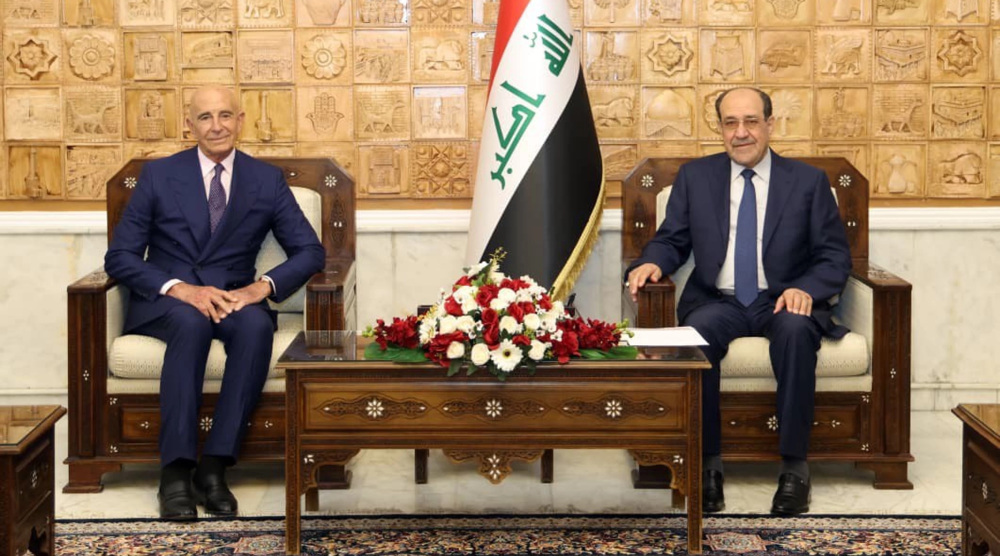US, Germany to reduce military presence in Iraq
The United States and Germany have announced they will reduce military presence in Iraq, months after Iraqi lawmakers passed a resolution calling on the government to end the presence of all Washington-led troops in the Arab counry.
During a visit to Iraq on Wednesday, Marine General Frank McKenzie, the US Central Command commander, confirmed the US military personnel would be reduced from 5,200 to 3,000 by the end of September.
The force reduction is due to “the great progress the Iraqi forces have made and in consultation and coordination with the government of Iraq and our coalition partners,” McKenzie said.
McKenzie said the decision is due to the United States’ “confidence in the Iraqi Security Forces’ increased ability to operate independently.”
The top US general in the Middle East claimed that the reduced size of military presence in Iraq would still be able to “advise” and “assist” Iraqi forces in rooting out the remnants of the Daesh terror group in the country.
Spokesman for the Iraqi Joint Operations Command (JOC), Major General Tahseen al-Khafaji said on Wednesday that the US decision came within an agreed timetable between the Iraqi government and Washington.
“The latest step to cut the number of US troops came as a result of coordination and joint work between us and the US-led international coalition forces,” al-Khafaji told the official Iraqi News Agency.
In August, Iraqi Prime Minister Mustafa al-Kadhimi visited the US for talks on the withdrawal of foreign forces from Iraq.
The visit came months after Iraqi lawmakers unanimously approved a bill on January 5, demanding the withdrawal of all foreign military forces led by the United States from the country.
The bill was a response to the assassination of Lieutenant General Qassem Soleimani, the commander of the Quds Force of Iran’s Islamic Revolution Guards Corps, along with Abu Mahdi al-Muhandis, the deputy head of Iraq's PMU, and their companions in a US airstrike ordered by President Donald Trump near Baghdad International Airport days earlier.
Later on January 9, the then Iraqi prime minister, Adel Abdul-Mahdi, called on the United States to dispatch a delegation to Baghdad tasked with formulating a mechanism for the move.
The 78-year-old politician said Iraq rejected any violation of its sovereignty, particularly the US military’s violation of Iraqi airspace in the assassination airstrike.
The long-expected decision to pull back American troops from Iraq comes as the US president attempts to deliver on his 2016 campaign promises while facing a tough reelection in November.
Trump was recently visibly distressed over the fallout that ensued from an article in The Atlantic, alleging that he privately disparaged the war dead, and feared losing support with the military.
According to the Friday expose published in the magazine, Trump had referred to dead American World War I troops in France as “losers” and “suckers” in 2018, further revealing that he had also canceled a trip to a military cemetery because he did not want his hair wet.
Trump has denied he made those comments.
Later on Wednesday, McKenzie told several media outlets that US troops in Afghanistan would also be decreased to about 4,500 by early November.
Germany also cutting back
Germany also announced that it would reduce the number of troops it has in the Arab country.
“Even during the coronavirus pandemic, IS [Daesh] continues to carry out its terrorist activities. The military pressure on the IS [Daesh] must be maintained,” said German Defense Minister Annegret Kramp-Karrenbauer on Wednesday.
Germany has about 415 soldiers in the US-led coalition purportedly fighting the Takfiri terrorist group of Daesh. About 120 of them are stationed in Iraq.
Most of Germany’s soldiers in Iraq are stationed in the northern Kurdish region of the country.
Germany has about 415 soldiers in the US-led coalition purportedly fighting the Takfiri terrorist group of Daesh. About 120 of them are stationed in Iraq.
Most of Germany's soldiers in Iraq are stationed in the northern Kurdish region of the country.
Iranian Army vows revenge after 'cowardly attack' by US Navy on Frigate Dena
Iran carries out 20th wave of Op. True Promise 4 against Zionist entity, US bases
Araghchi to Trump: Plan A of military victory failed, Plan B will be 'bigger failure'
USS Abraham Lincoln flees after precision strike by IRGC drones in Sea of Oman
Yemen signals readiness for unified front with Iran against US-Israeli war coalition
Iran’s Army and IRGC destroy seven more Hermes, MQ-9 drones in retaliatory ops
'Iran no place for Hell dwellers': Iran’s security chief warns against ground offensive
Unpacking glaring contradictions in US-Zionist justifications for war against Iran
















 This makes it easy to access the Press TV website
This makes it easy to access the Press TV website